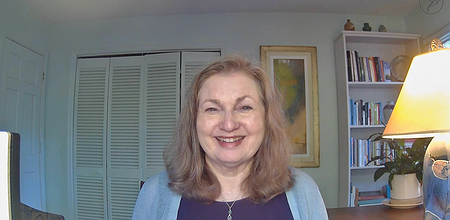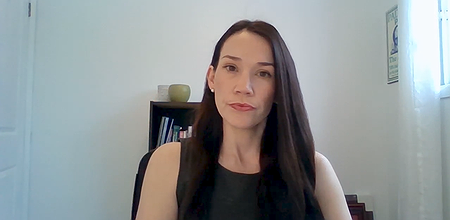This workshop includes theory as well as clinical examples. It includes videos ranging from 5-15 minutes in length. The PowerPoint of the workshop can be downloaded.
Personality Structure and Its Implications for Psychotherapy
Dr. Nancy McWilliams, Psychologist
All interventions begin with a proper assessment of the patient’s personality structure. Learn just how to do that with Dr. McWilliams.
Excerpt: individual patterns & defensive organization
- 6h of continuing education
- 37 lessons that last from 5 to 15 minutes each
- 1 certificate of achievement
- 1 power-point
- 1 bibliography
- 1 course evaluation
- 4 months access - automatically extended until you complete the course
- 7-day money back guarantee
- 96% of participants who completed the satisfaction survey declare they would recommend this course to a colleague
Overview
The influence of individual differences on the psychotherapeutic process is immense. Research shows that personality factors and relational systems have a greater impact on the outcome of psychotherapy than the theoretical model or type of treatment chosen. To enable you to customize psychotherapy to the learning styles and unique characteristics of your clients, Dr. McWilliams provides crucial information for a detailed understanding of personality.
She delves into aspects such as temperament, attachment style, various defensive organizations, motivational systems, different levels of severity, core conflicts, relational patterns, and the maintenance of self-esteem. Additionally, she offers key guidelines for engaging with personalities exhibiting borderline, psychotic, depressive, and schizoid traits, in a sophisticated training that is nonetheless accessible to all psychotherapists.
Although some background in basic psychoanalytic ideas may be helpful, neither an in-depth familiarity with psychoanalysis nor a commitment to psychodynamic approaches is necessary to benefit from this training. The workshop is oriented toward an inclusive, diverse population of therapists of all theoretical orientations who struggle with short or long-term issues rooted in personality in a range of settings, with an emphasis on the practical applications of the concepts.
About the expert
![Picture of Nancy McWilliams [en]](/media/studeo/teachers/2020/nancymcwilliams.png.500x500_q85_box-0%2C0%2C350%2C350_crop_detail.png)
Dr. Nancy McWilliams, psychologist, teaches at the Graduate School of Applied & Professional Psychology of Rutgers University, and practices in Flemington, New Jersey.
She is author of Psychoanalytic Diagnosis (1994, rev. ed. 2011), Psychoanalytic Case Formulation (1999), Psychoanalytic Psychotherapy (2004), and an upcoming book on overall wellness. Her books are available in 20 languages. Dr. McWilliams lectures widely both nationally and internationally.
She is associate editor of the Psychodynamic Diagnostic Manual, 2nd ed. (2017), a former president of Division 39 (Psychoanalysis) of the APA, and an honorary member of the American Psychoanalytic Association. She has been featured in three APA videos of master clinicians, the most recent being Three Approaches to Psychotherapy.
Learning objectives
- To explicate the differences between, and the respective clinical implications of, categorical and dimensional approaches to describing individual differences
- To enumerate ten evidence-based angles of vision through which personality can be conceptualized
- To use clinically relevant ways to frame personality organization and disorder, both typologically and in terms of relative degree of mental health
- To apply the contributions of research on affect and attachment to the understanding and treatment of psychological problems rooted in personality and and to use the Psychodynamic Diagnostic Manual, second edition, as a clinical resource
Learning material
Syllabus
- PowerPoint
-
Introduction
- 1. Introduction
- 2. DSM & PDM
- 3. Temperament
- 4. Attachment style
- 5. Individual patterns & defensive organization
- 6. Implicit cognitions
- 7. Affective patterns
- 8. Drive
- 9. Individualistic vs Communal orientation
- 10. Internalized object relations
- 11. Organizing developmental issue
- 12. Conception of the new PDM-2
- 13. Structure of the new PDM-2
-
Borderline and psychotic structures
- 14. Main phase theories pt.1
- 15. Main phase theories pt.2
- 16. Origins of the borderline concept pt.1
- 17. Origins of the borderline concept pt.2
- 18. Origins of the borderline concept pt.3
- 19. Work with borderline patients
- 20. Thoughts on the DSM model for personality
- 21. Thoughts on brain plasticity
- 22. Thoughts on antisocial vs psychotic in the DSM
- 23. How to work with psychotic patients
- 24. Psychotic range - classic and newer ressources
- 25. Question - should use normalization with non psychotic patients
- 26. Question - how to deal with delusion
- 27. Question - how to use normalization without reinforcing patients
-
Depressed and masochistic personnalities
- 28. Introduction
- 29. Depression vs normal loss
- 30. Affect, cognitions and defenses
- 31. Transferance and counter transferance
- 32. Masochistic patients - subtypes
- 33. Treatment implications for self-defeating patients
- 34. Question - how to avoid hiding suggestion behind interpretation
- 35. Question - how to deal with the intense counter transferance caused by patients who live in much violence
-
Schizoid personnalities
- 36. Characteristics, affects, defenses, cognitions
- 37. Transferance, counter transferance and treatment implications
- Bibliography
CE Credits
Download a certificate of successful completion.
Audience
This training is intended for mental health professionals.
Your comments
"Constantly thought provoking. A good balance between theory and practical implications/applications."
A psychologist (Australia)
"I loved this course and was so happy I found it!" (automatically translated)
A counseling
"This was one of the most interesting courses I have taken. It's really great to get the perspectives and examples from such an experienced and reflective therapist."
A counseling (Canada)
Registration
Ask a question
Do you have a question? Then email us at contact@asadis.net
Frequently asked questions
-
How long do I have access to the course?
After your registration, the course is accessible anytime and from anywhere for 124 days. And if that’s not enough, we’ll automatically extend your access.
-
When does the course start?
That is entirely up to you! When you buy a course, you'll receive an access link that you can activate when you want.
-
Is there a student rate?
Yes there is! To learn more, email us at contact@asadis.net.
You may also be interested in:
Legal notice
The courses offered by ASADIS are accredited by different professional organisations. In addition, ASADIS is approved by the Canadian Psychological Association to offer continuing education for psychologists. ASADIS maintains responsibility for the program.
The CPA’s approval of an individual, group, or organization as a CE Sponsor or Provider is restricted to the activities described in the approved application or annual report form. The CPA’s approval does not extend to any other CE activity the Sponsor or Provider might offer. In granting its approval, the CPA assumes no legal or financial obligations to Sponsors, Providers, or to those individuals who might participate in a Sponsor or Provider’s CE activities or programs. Further, responsibility for the content, provision, and delivery of any CE activity approved by the CPA remains that of the CE Sponsor or Provider. The CPA disclaims all legal liability associated with the content, provision, and delivery of the approved CE activity.




